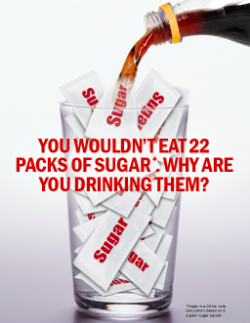A San Francisco Soda Tax for a Healthier City
A San Francisco soda tax of 2 pennies per ounce is on the ballot in November 2014. This could be the first such tax in the country to pass and would be a great step towards making SF a healthier city. The reactions that I've read thus far to this tax have surprised me and motivated me to clearly explain the details of tax and why it is worth supporting. Read on to get accurate information based on facts, not emotions or press releases from soda industry funded "activists".
What are the details of the San Francisco soda tax?
The 2 cent tax would add about 40 cents to the cost of a 20oz bottle of soda. It will not be applied like a sales tax (which is added to the product cost at the cash register), but instead it will be charged directly to the beverage manufacturer (and one would assume manufacturers will pass the tax onto consumers by raising their prices). It will apply to soda, energy drinks, and other sugar sweetened beverages with more than 25 calories; diet sodas and naturally sweetened beverages like juice would not be included.
Come on, another tax?
This is a little different than most taxes in that the primary purpose is not to raise revenue but instead to influence consumer behavior. The goal is to help consumers make healthier choices, similar to the cigarette taxes that have very effectively reduced the number of Americans that smoke. This tax is expected to raise about $30 million and by law the revenue must be used to fund active recreation and nutrition programs in San Francisco public schools, parks, and recreation centers; food access initiatives, drinking fountain and water bottle filling stations; and dental health services. In other words, the revenue from this tax will go right back to the SF residents that are statistically most likely to be at risk for obesity to help educate them to make better decisions.
Doesn't this tax unfairly burden SF's poorest residents?
Unfortunately, lower-income residents are already unfairly burdened with obesity and other health issues. These same residents also consume more sugared beverages. Unlike a traditional regressive sales tax, which taxes everyday items that consumers of all income levels have no choice but to buy, there is an easy way to avoid the impact of this tax. Those that are financially burdened by the San Francisco soda tax can drink fewer sugared beverages, instead choosing other (healthier) options that will quench their thirst and not have the additional tax applied. In the long run, by avoiding sugared beverages, these residents will have saved money and given themselves a better chance to living a healthy life.
I'm an adult, can't I make my own decisions about what I do to my body?
I hear you and I agree for the most part. However, there are many kids out there that drink soda every day without knowing or understanding the long term effects this will have. In most cases, it is these same children that are not making purchasing decisions. So, if you are an adult and choose to drink soda and would be paying more for it, think about the children who will be drinking healthier beverages because they can't afford the tax or because they learned how to make healthier decisions based on tax funded nutrition education programs. A few cents tax on your soda is a small tax to pay if it can save children from a lifetime of obesity related health issues.
But will this solve the obesity problem?
Of course not, it's only a small step in the right direction! But sugar sweetened beverages are one of the largest contributors to obesity and one of the easiest things to cut out from a diet. This tax will play a role in raising awareness to how big of a deal obesity is in this country and how small changes in habits can have a tremendously positive effect on health. The programs funded from this tax will be used to teach people how to embrace an overall healthy diet (not just about healthy beverage choices).
Obesity? Is that really a problem?
Yes! It is a FACT that obesity rates have grown significantly in the last few decades. It is also a FACT that obesity is directly related to increased health problems and money spent on health care. In fact, the medical costs for someone who is obese averaged $1,428 higher than those of someone normal weight in 2008. That adds up to about $147 billion spent to treat obesity in a single year.
Is soda really that unhealthy for you?
I could bore you with lots of medical studies telling you that your body doesn't process sugary beverages the same way it does food, and that drinking sugary sodas for just two weeks contributes to the development of diabetes and heart disease. Or I could just show you this chart and let common sense be your guide.
I encourage you to support a healthier city and vote in support of the San Francisco soda tax. Two cents an ounce is a small price to pay to help reduce obesity.

